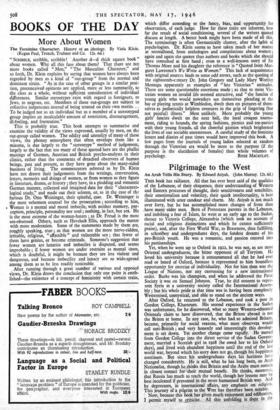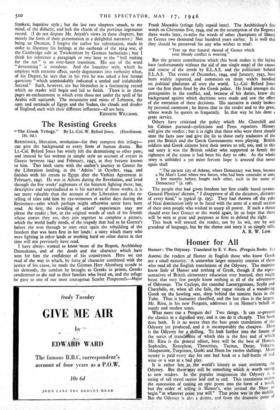Pilgrimage to the West
An Arab Tells His Story. By Edward Atiyah. (John Murray. 12s. 6d.)
THIS book has radiance. All that has ever been said of the qualities of the Lebanese, of their eloquence, their understanding of Western and Eastern processes of thought, their sensitiveness and sensibility, their emotionalism and volatility, their quick intellectuality, is here illuminated with utter candour and charm. Mr. Atiyah is not much over forty, but he has accomplished more changes of front than have many older men. Born of Protestant parents in the Lebanon, and imbibing a fear of Islam, he went at an early age to the Sudan, thence to Victoria College, Alexandria (which took no account of racial and religious distinctions and which he cannot sufficiently praise), and, after the First World War, to Brasenose, thus fulfilling, in schoolboy and undergraduate days, the fondeSt dreams of his pro-British youth. He was a romantic, and passion entered into his partisanships.
Yet, when he went up to Oxford in 1922, he was not, as are most Oriental undergraduates, the bitter opponent of all Toryism. He loved his university because it consummated all that he had ever read or heard of Oxford, because it represented to him boundless opportunity for exercise of individuality. Not for him then was the League of Nations, nor any canvassing for a new international order. Burke was his champion, and when he addressed the Pater Society it was on Samuel Johnson. True, he did consent to repre- sent Syria at a university society called the International Assem- bly ; but his whole pride at that time was in having been completely Westernised, tmtnystical, and able to stand on the ancient -ways. After Oxford, he returned to the Lebanon, and took a post in Gordon College, Khartoum. His second experience in the Sudan was unfortunate, for he discovered, what so many Western-educated Orientals claim to have discovered, that the Briton abroad is not the Briton at home. In any case, he, who had so admired Britain. became, primarily for social reasons, what most -observers would call anti-British ; and very honestly and interestingly this develop- ment is set down. Yet another change came rapidly. He moved from Gordon College into the direct service of the Sudan Govern- ment, married a Scottish girl in 1928 (he owed her to his Oxford days), and lived with abundant happiness until the end of the last world war, beyond which his story does not go, though his happiness continues. But since his undergraduate days his horizons have changed considerably. He is still, what he has long been, an Arab Nationalist, though he thinks that Britain and the Arabs must remain in closest contact for 'their mutual benefit. He thinks, moreover, that Russia has much to teach the world, though her lessons may be best inculcated if presented in the more humanised British way. And he deprecates, in international affairs, any emphasis on religion. This journey of a pilgrim to the West has therefore been notable. Now, because this book has given much enjoyment and edification, I permit myself to criticise. All this unfolding is done in the
frankest, loquitive style - but the last two chapters smack, to my
mind, of the didactic, and the charm of the previous ingenuous record. (I do not dispute Mr. Atiyah's views in these chapters, but merely the form of their presentation in a delightful narrative.) Not being an Oxonian, I forgive the author his substitution, made in order to illustrate his feelings at the outbreak of the 1914- war, of the Cambridge side at Twickenham by German barbarians ' - but I think his reference a paragraph or two later to the " ball making for the net " is an over-hasty transition. His use of the word " devastating " is overdone. And the loquitive style, which he employs with extreme effect, surely degenerates into verbosity when, of his Degree, he says that in his viva he was asked a few formal questions " which unmistakably indicated a settled and indubitable Second." Such, however, are but blemishes in a fascinating record which no reader will begin and fail to finish. There is in these pages an enchantment to which even those not under the spell of far Arabia will succumb. The mountains and mists of Lebanon, the suns and certitude of Egypt and the Sudan, the clouds and doubts of England, each with their different influence—all are here.
KENNETH WILLIAMS.































 Previous page
Previous page